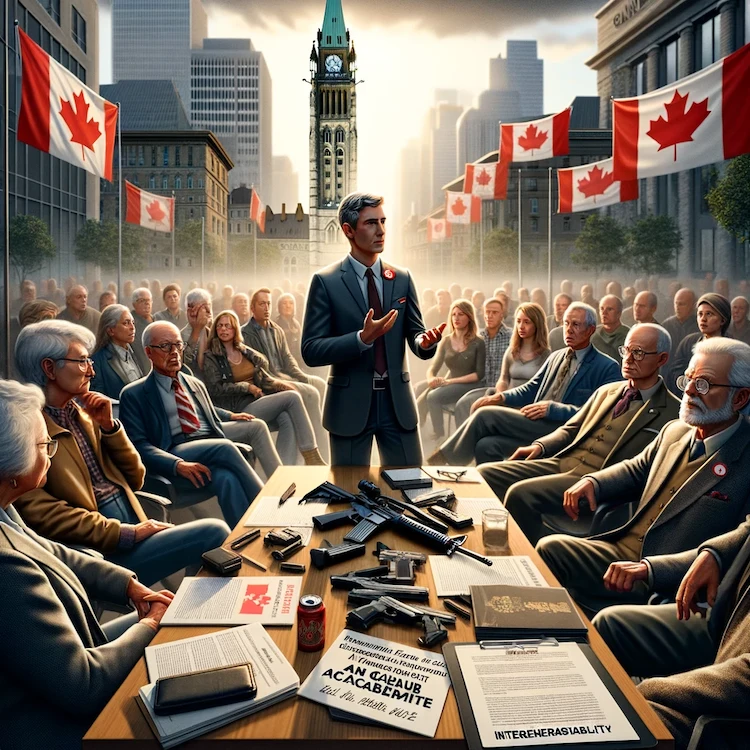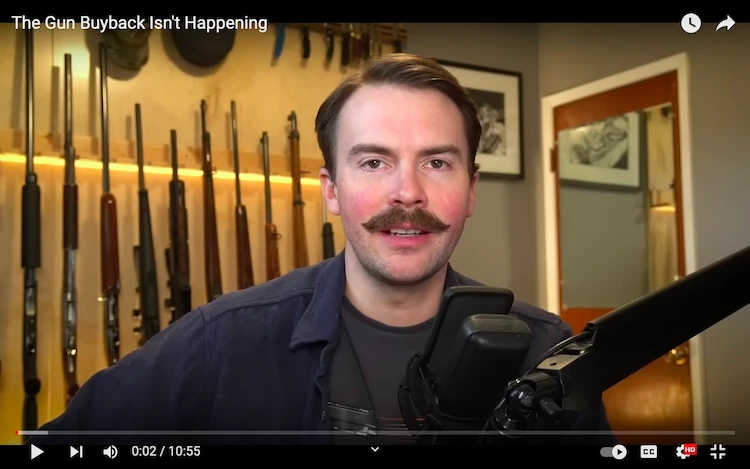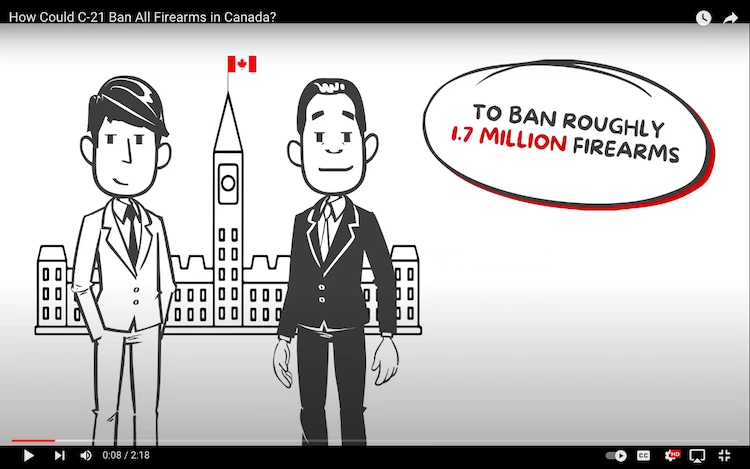The Gun Buyback Isn’t Happening
darrylcote3971 comment: “@HitlerTummy14 guess we won’t count on you when the time comes. Great job  “
“
Skills Gap Trainer comment: “@ … Tummy14 Our team at SGT, and colleagues and friends of SGT, understand your sentiment. When you look at the landscape of Canada today, it’s hard not to feel a sense of disillusionment. There’s a pronounced inequity that’s hard to ignore, and seldom addressed within the House of Commons by some political factions other than the Conservatives. Public agencies, such as CMHC / zoning authorities responsible for allocating 16 million square km of land to the Millenials and Gen Z, consistently neglect to provide even 1 square km for the upcoming generations, with intricate land access procedures more complex than space shuttle engineering. Administrators in these sectors, some earning between 100k to 700k annually, seem prosperous, while our nation’s future — the young trailblazers with degrees in engineering, computer science, and other STEM fields — often barely get by, many earning just 5k to 7k annually from 2004 to 2023. This trend of sidelining millennials persisted for two decades, as we saw it in our community. The professionals locally discussed it in hushed tones, often preoccupied with their demanding professions, such as medical doctors, dentists, professors, engineers, CEOs, board of directors on various non-profit groups etc.. The setup often benefits the bureaucratic machine at the expense of genuine innovators. Such biases are evident during inflationary episodes, similar to those in Weimar Germany, where pay adjustments upwards that keep up with inflation are made predominantly for officials, sidelining the broader populace which are not adjusted up with inflation.
However, stay strong and hopeful! Succumbing to despair only bolsters those who’ve already taken so much. Do they truly merit another victory by bringing us down? Absolutely not!
Such lopsided reward systems propagate a narrative in North America that feels rather ‘anti-life.’ This viewpoint seems prevalent among the administrative echelons, appearing more negative than positive. The prevailing sentiment doesn’t seem inclined towards fostering a thriving next generation. It almost feels like a conscious effort to reward administrative roles over those who genuinely contribute to society and enhance Canada’s overall financial health, for instance: export sectors like commodities and technology. Reflect upon the hindrances faced by Canada’s economic machinery for almost a decade. All these make one ponder the true value and essence of Canadian identity.
Empowerment, sovereignty, and most importantly, the future, are all worth standing up for. The emerging generations, Millenials and Gen Z, face challenges to their prospective futures. By acquiring self-defense tools, memberships such as RPAL & CORE, HAM Radio/DMR, LoRA mesh communicators, STEM skills, hunting skills, camping skills and professional qualifications, Canadians signal more than just self-protection, resiliency, and capability to overcome any crises or challenge. They’re proclaiming, “I won’t be manipulated in this grand design. I reject your ‘anti-life’ perspective, and won’t let you dictate my autonomy, security, or financial decisions.”
The individual showcasing a firearms can also symbolizes resistance and aspirations to invest in sovereign alternative assets, akin to the prestige of a Rolex or Corvette. Such gestures, combined, form a collective stand against any oppressive forces or forces which seek to own that which does not belong to them. Despite the grim outlook, it’s crucial not to align with those promoting detrimental ideologies. Distance from those who appear to support restrictive agendas against youth or family prosperity. Remain vigilant and proactive. A true patriot isn’t overcome unless they abandon the cause. Our collective will, autonomy, and rejection of suppressive norms and overt ownership of our identity, our person, our family, and our place of residence, define our strength, not political commentary about what are strength is that is not really our true strength. Advocate for parties that prioritize the youth and future, not the past, fostering industrial, technological, and economic progress. That is the mistake we can fix that the older generations made, they prioritized the past, and forgot the importance of the future. Bu we can fix it!”
colony007 comment: “@skillsgaptrainer your depth is admirable.”

Related books and resources:
“Reflections on the Revolution in France” by Edmund Burke: Burke’s philosophical treatise discusses the concept of social contracts and intergenerational responsibility, which is central to your discussion. It provides a foundational understanding of societal obligations across generations.
“The Better Angels of Our Nature: Why Violence Has Declined” by Steven Pinker: Pinker’s analysis of violence and safety through history could provide context for the debate on firearms policy and national resiliency.
“Canadian Firearms Law: Understanding The Real Issues” by Solomon Friedman: This book offers an overview of Canadian firearms law, which might help in understanding the legal backdrop against which Bill C-21 and gun buyback programs are set.
“Generations: The History of America’s Future, 1584 to 2069” by William Strauss and Neil Howe: While focused on American history, this book offers insights into generational cycles and could provide a comparative perspective on intergenerational accountability in Canada.
“The Myth of the Rational Voter: Why Democracies Choose Bad Policies” by Bryan Caplan: Caplan’s exploration of democracy and public choice can add depth to discussions about political strategy and public perception, especially in the context of firearms policy.
“Bowling Alone: The Collapse and Revival of American Community” by Robert D. Putnam: Putnam’s work on social capital and community engagement could enrich the conversation about community commitment and the sense of disillusionment expressed by citizens.
“Democracy in America” by Alexis de Tocqueville: Provides classical insights into democratic societies, including themes of civic responsibility and political neglect, relevant to the debate on Canadian identity and politics.
“The Economics of Inequality” by Thomas Piketty: Piketty’s analysis of economic inequity can provide background for discussing administrative bias and economic equity in Canada.
“Why Nations Fail: The Origins of Power, Prosperity, and Poverty” by Daron Acemoglu and James Robinson: Offers insights into how political and economic institutions shape nations, relevant to discussions on systemic corruption and economic reform.
To see our Donate Page, click https://skillsgaptrainer.com/donate
To see our Instagram Channel, click https://www.instagram.com/skillsgaptrainer/
To see some of our Udemy Courses, click SGT Udemy Page
To see our YouTube Channel, click https://www.youtube.com/@skillsgaptrainer



Skills Gap Trainer comment: “Nice firearm collection. It’s obvious Canadians can count on you if the country is invaded. Thanks for being a responsible firearms owner, the backbone of national resiliency and capability in times of great crisis.”